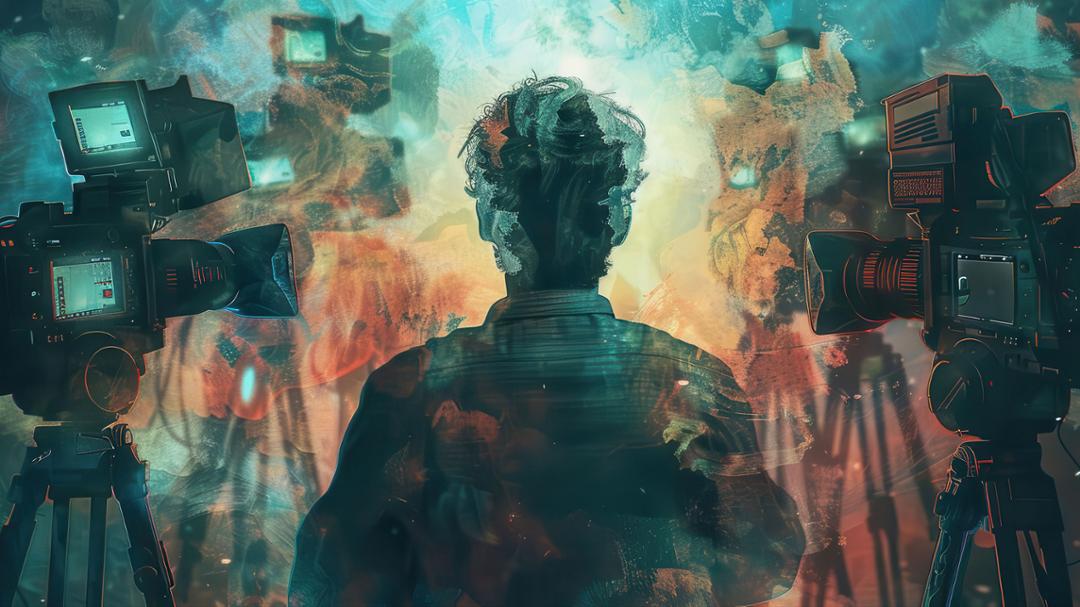With press freedoms deteriorating worldwide, the Department of Journalism & Creative Media Industries is identifying ways to protect democracy and the right to independent news.
Marina Ovsyannikova approached the podium in Texas Tech University’s Hall of Nations. The hall, located in International Affairs, was host to the Excellence in International Journalism and Human Rights Awards Symposium earlier this year.
Ovsyannikova made the trip from Paris to share her harrowing story. The former Russian state news anchor was joined by 11 other women – journalists from the Middle East.
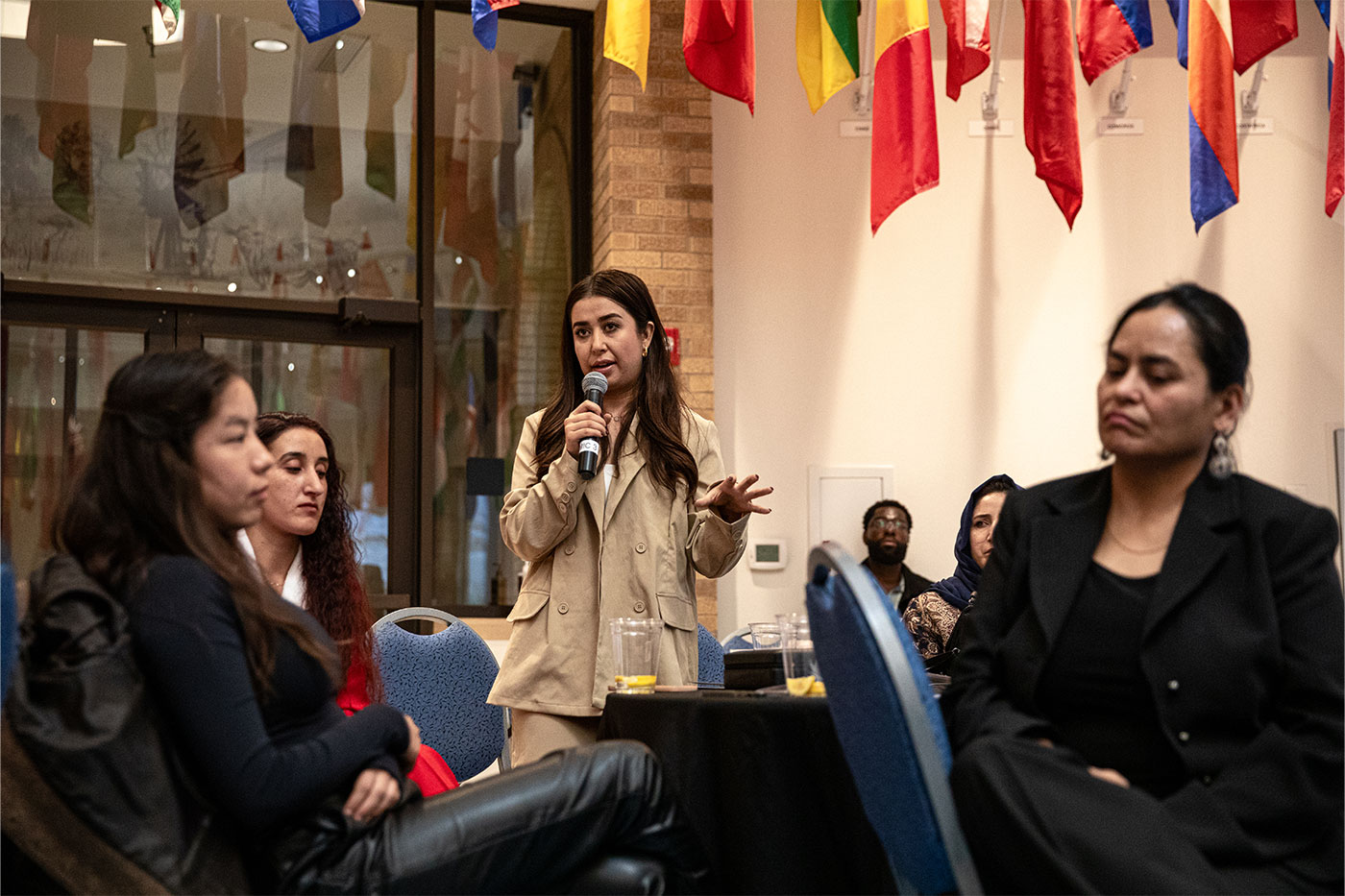
Each of them recounted their loss.
Loss of jobs, loss of family, loss of freedom.
Ovsyannikova, a harbinger dressed in black with a lilac-colored blazer, addressed attendees.
“The first causality of war is always truth,” she said.
An Increasingly Common Story
Ovsyannikova was placed under house arrest in 2022. Shortly after the conflict between Russia and Ukraine broke out that year, Ovsyannikova interrupted a broadcast protesting the war.
“The war became a point of no return for me,” she recalled.
She worked for Channel One, a Russian television channel, for roughly 20 years, engaging in what she now calls spreading “Kremlin propaganda.” Ovsyannikova had a successful career and was able to look the other way over the years. But when the war began, she faced an internal crisis.
She and her parents had lived in Grozny when the Chechen War began.
“My house was destroyed by Russian troops, and I became a refugee,” she said. “I understood perfectly well what awaited Ukrainian women and children.”
When asked if she paused to think about the ramifications her protest would have on herself or her family, Marina responded, “At that moment, all I understood was there was a monstrous crime happening. I simply could not play by the Kremlin’s rules.”
Ovsyannikova was detained and questioned after her six seconds of on-air protesting, during which she held up a sign that read: “Stop the war, don’t believe the propaganda, you are being lied to. Russians against war.”
She was fined and placed under house arrest while awaiting trial. If found guilty, she faced up to 10 years in prison. She says murderers get less time in Russia.
Months passed and as autumn came, her lawyer realized the trial would not go well. He urged Ovsyannikova to take her child and flee the country.
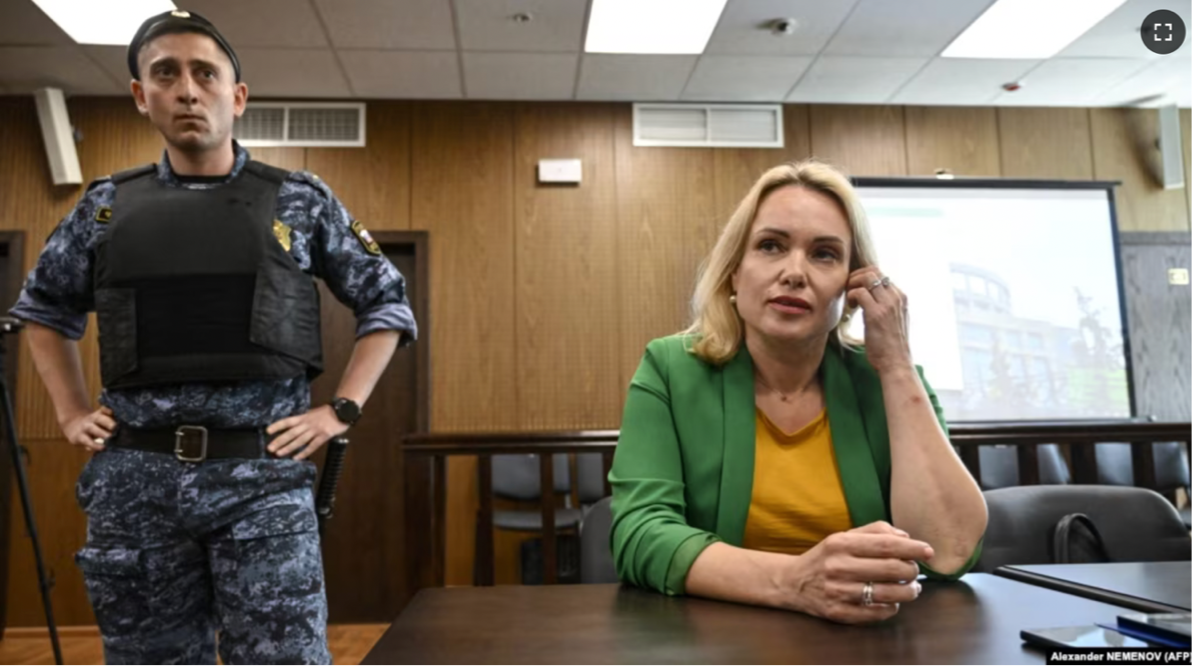
Aided by Reporters Without Borders in France, she and her 11-year-old daughter were able to cross the border in the middle of the night.
“The escape was planned for a Friday night, at which time law enforcement was already relaxing at the dacha with drinks,” Ovsyannikova recalled. “We changed cars seven times, but the last one got stuck in mud.”
She and her daughter wandered through pitch-dark fields for hours, hiding from spotlights and border control.
“It was the limit of human capabilities,” Ovsyannikova said. “At some point I ran out of strength and couldn’t take another step. But my daughter told me, ‘Mom, get up or you’re going to jail.’”
The two found their way to safety after the longest night of their lives.
Bravery & Perseverance
Ovsyannikova and her daughter have been living in France, frequently relocating for safety. Unfortunately, such journalistic persecution is on the rise around the world.
In early 2024, William S. Morris Professor in Innovation, Journalism and Information, Lyombe Eko, invited Ovsyannikova to Texas Tech’s Annual Excellence in International Journalism and Human Rights Awards Symposium.
The university recognizes two journalists each year with the Excellence in International Journalism Award. Recipients are those who exhibit bravery, perseverance and commitment to a free press.
“As a university that has a global outlook illustrated by our policy of communicating in a global society, Texas Tech is engaged in communicating the human right of freedom of speech and of the press not only to our students but also to journalistic and media communities and publics around the world,” Eko said.
“That is why we have instituted this award. It highlights and honors female journalists whose right of freedom of expression is being suppressed or curtailed in many parts of the world.”
In addition to Ovsyannikova, the other award recipient was Saleha Soadat.
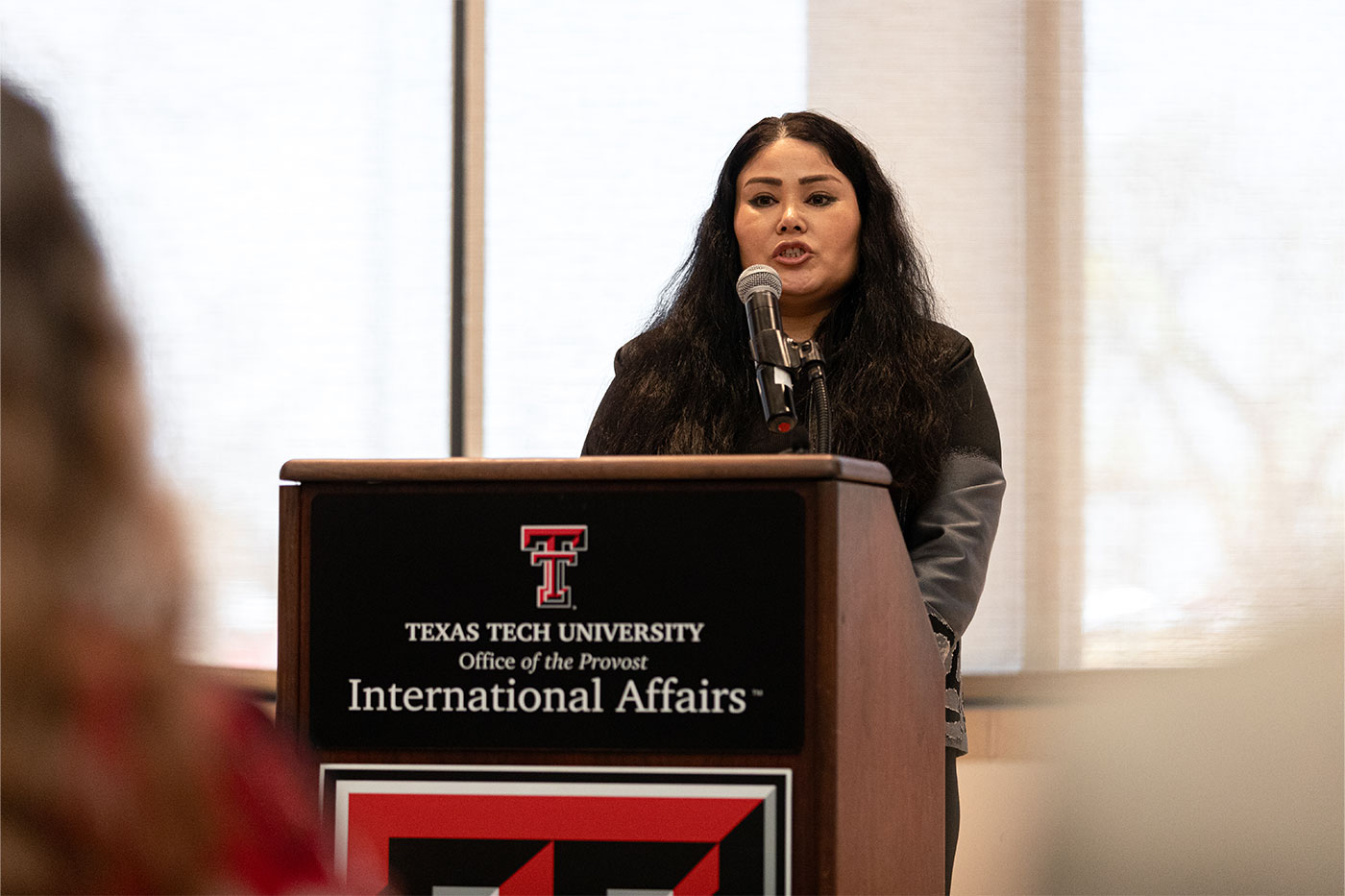
Soadat enjoyed great success as a television reporter in Kabul before U.S. troops pulled out of the country in August 2021. Forced to flee for her life, Soadat is now a graduate student at Texas Tech, studying journalism and conducting research into the history of female journalists in the Middle East.
“Even though I’m not physically in Afghanistan, my dedication to my fellow Afghans remains unwavering,” Soadat said. “I am a journalist committed to reporting the truth.”
Truth is the only thing that matters for brave journalists facing retribution, violence and even death around the world.
A Global Crisis
While the right to access reliable and independent news is a human right that many countries protect, press freedoms have been deteriorating over the past 15 years according to NGOs such as Freedom House and Reporters Without Borders.
The United Nations’ Security Council has passed numerous resolutions to protect journalists who put themselves in harm’s way to report on events that, without accountability, could lead to genocide, war crimes, ethnic cleansing and crimes against humanity.
“Freedom of press is being challenged as never before in virtually all parts of the world,” Eko said. “As wars and conflicts multiply, so do restrictions on the media.”
This can be observed today in places such as Palestine, Ukraine and Myanmar, just to name a few. As war escalates, it becomes increasingly difficult for the media to gain access in a safe way.

Then, there are countries that have been hostile to journalists for a long time. Eritrea, Syria, Afghanistan, North Korea and Iran lead Reporters Without Borders’ 2024 World Press Freedom Index for the five most abusive countries for journalists to work.
While those rankings may not come as a surprise, others might.
In 2020, the U.S. ranked No. 45 of 180 nations. It has fallen to No. 55. Hong Kong, long considered a democratic beacon of the east, was No. 80 in 2020 and is now ranked No. 135. Even nations such as Australia have fallen more than 10 places in recent years.
Each country is evaluated using five contextual indicators that reflect press freedom. Those are: political context, legal framework, economic context, sociocultural context and safety. A subsidiary score ranging from 0 to 100 is then calculated.
Many countries rank highly, allowing journalists to access information openly, work without censorship and support independent approaches. Other countries, however, rank very poorly. In 2024, there was a global fall of 7.6 points.
One reason freedom of press is on the decline is impunity; meaning there is a lack of accountability, prosecution and consequences for those who harm journalists.
The United Nations released a resolution in 2015 that called for an end to impunity and for prosecution of those responsible for serious violations of international law. Almost a decade later this is still a significant challenge.
Why?
Press freedoms follow the societal fabric of the nations they exist in. Across authoritarian regimes and democracies alike, research signifies that political rights and civil liberties are on a decline. This indubitably affects the reporters who cover these phenomena.
Putting It Into Practice
Texas Tech’s Department of Journalism & Creative Media Industries is committed to training journalists to report the truth and is actively engaged in protecting a free press.
In addition to the journalism symposium earlier this year, the department just completed its inaugural Maymester course “Journalism, Borderlands & Border Crossings.”
Certain parts of the world are more dangerous for journalists to access. Borderlands can be one of those places. Borders pose unique challenges for the people who need to cross and the governments who need to maintain them.
In this course, Texas Tech students spent two weeks in Junction, Marfa and Del Rio, Texas, interviewing U.S. Customs and Border Protection Officials and the Texas Military Department. They also collaborated with reporters from USA Today, Laredo Morning Times and Big Bend Sentinel.
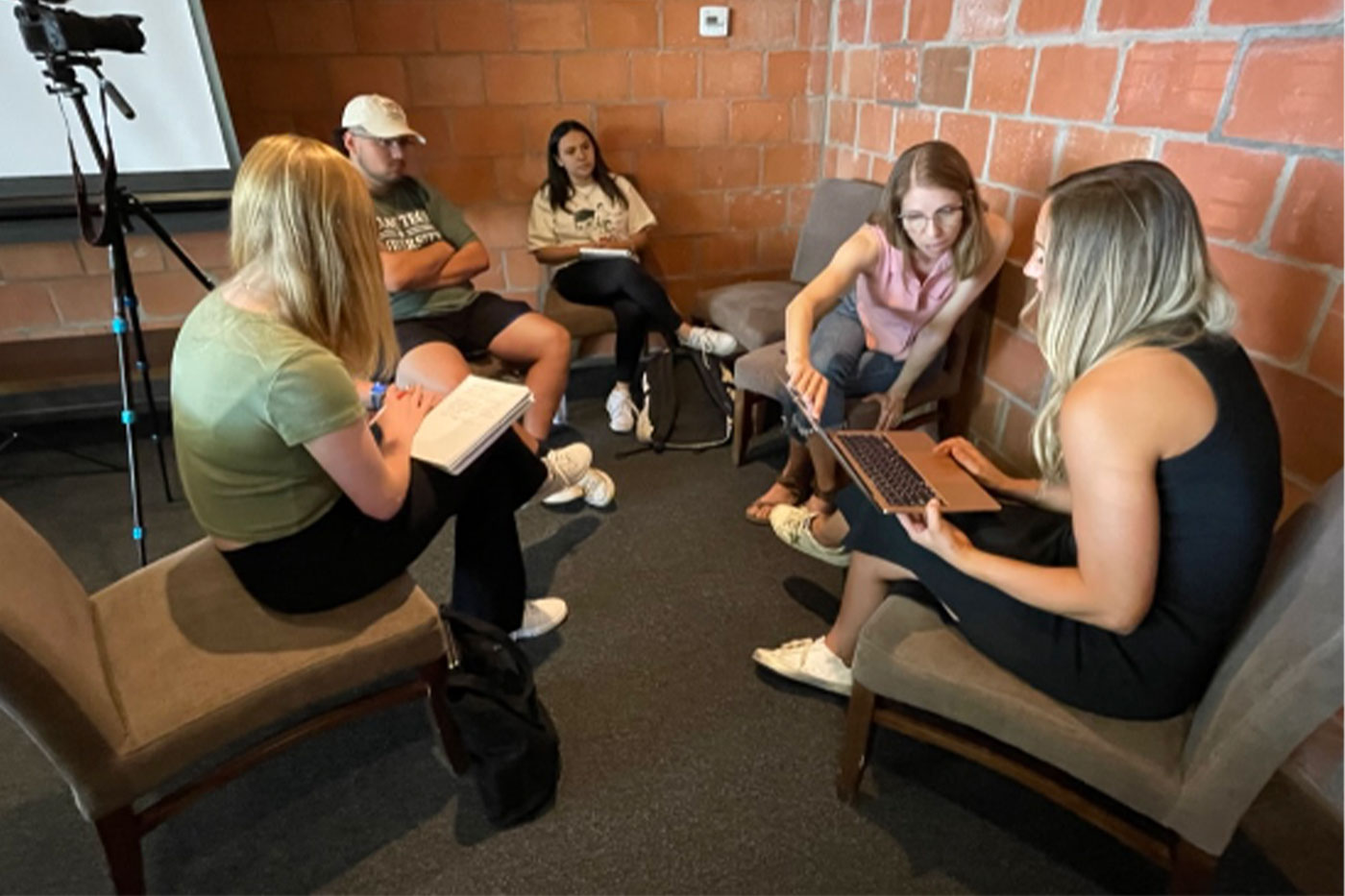
“Getting to collaborate with American and Mexican journalists was so motivating to me,” said third-year journalism student Aynsley Larsen.
The San Antonio native came to Texas Tech as an English major but quickly changed her course of study after taking a job with The Daily Toreador.
“I fell in love with journalism,” she said.
Larsen has taken a few journalism courses so far, but said this one taught her more in two weeks than many did in a whole semester.
“I’ve learned how important a free press and unbiased reporting is,” she said. “What I saw in Del Rio is that there is journalism present in these areas, but not enough to keep up with how many stories there are. There’s a lot more happening there than what can be perceived on the outside. And there are stories being missed either because people are afraid to talk to the media or because journalists can’t always access these areas.”
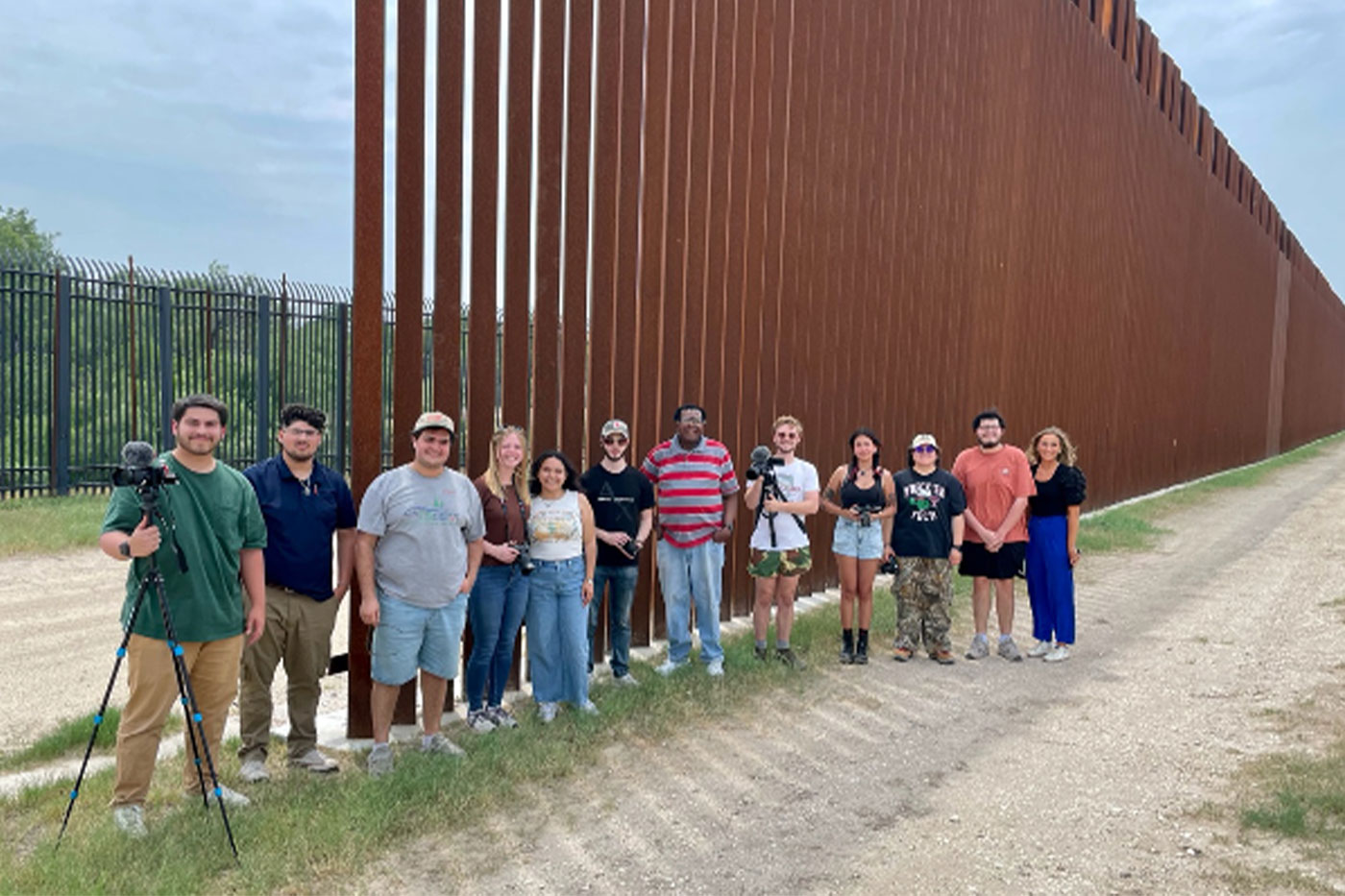
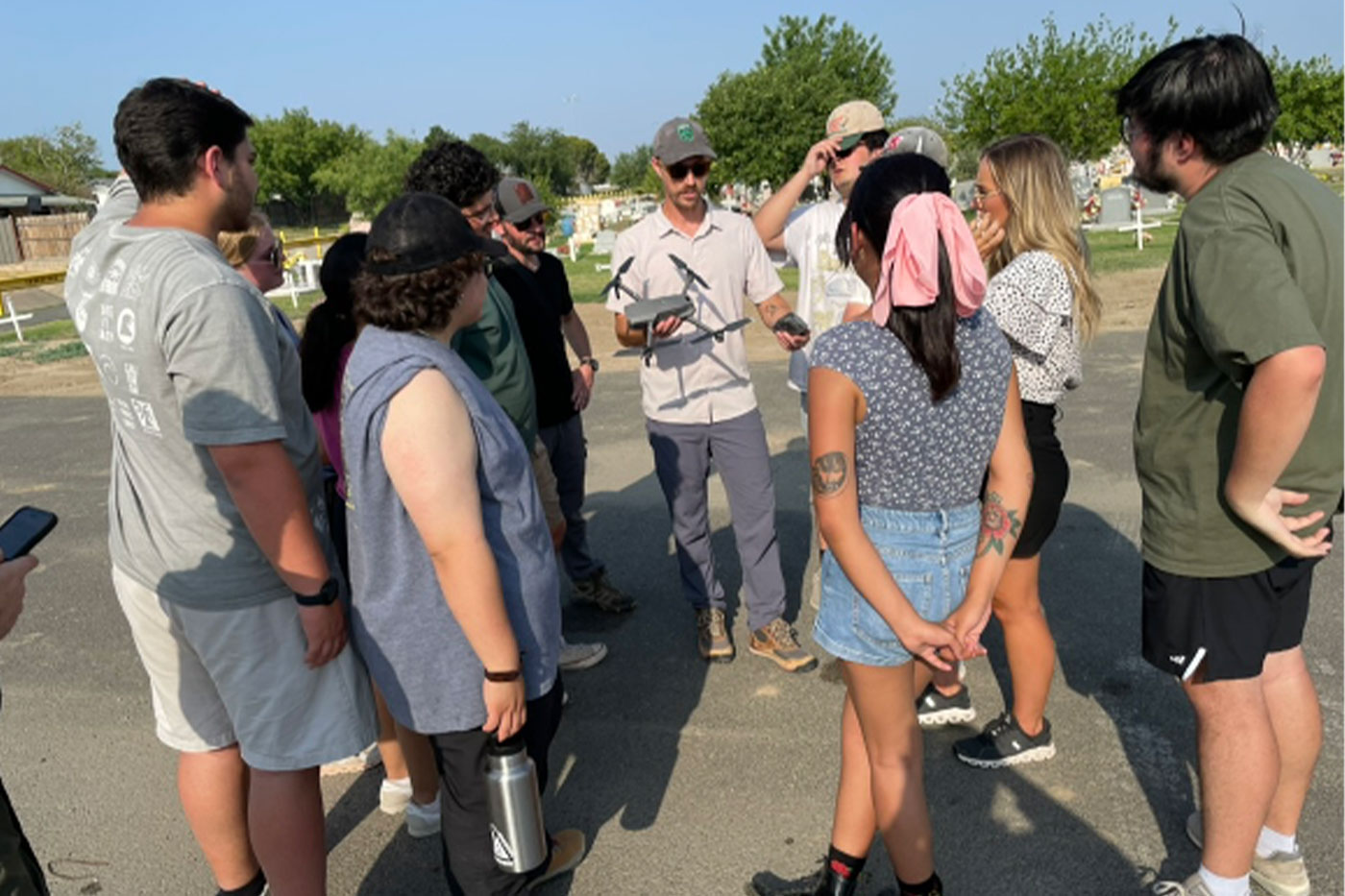
While hands-on courses and events are a crucial part of training future journalists, academic research is another way to aid a free press, by identifying patterns and learning from history so it will not be repeated.
Graduate student Mahedi Hasan recently completed his thesis entitled, “Journalistic Resistance to Russian Authoritarian Disinformation: The Case of Media Dissidents in the Russia-Ukraine Wars of 2014 and 2022.”
His thesis won first place in Texas Tech’s Outstanding Thesis Dissertation Awards; a competition held across the entire university.
When Ovsyannikova visited campus, Hasan was able to meet her. His thesis, in large part, was written about Ovsyannikova.
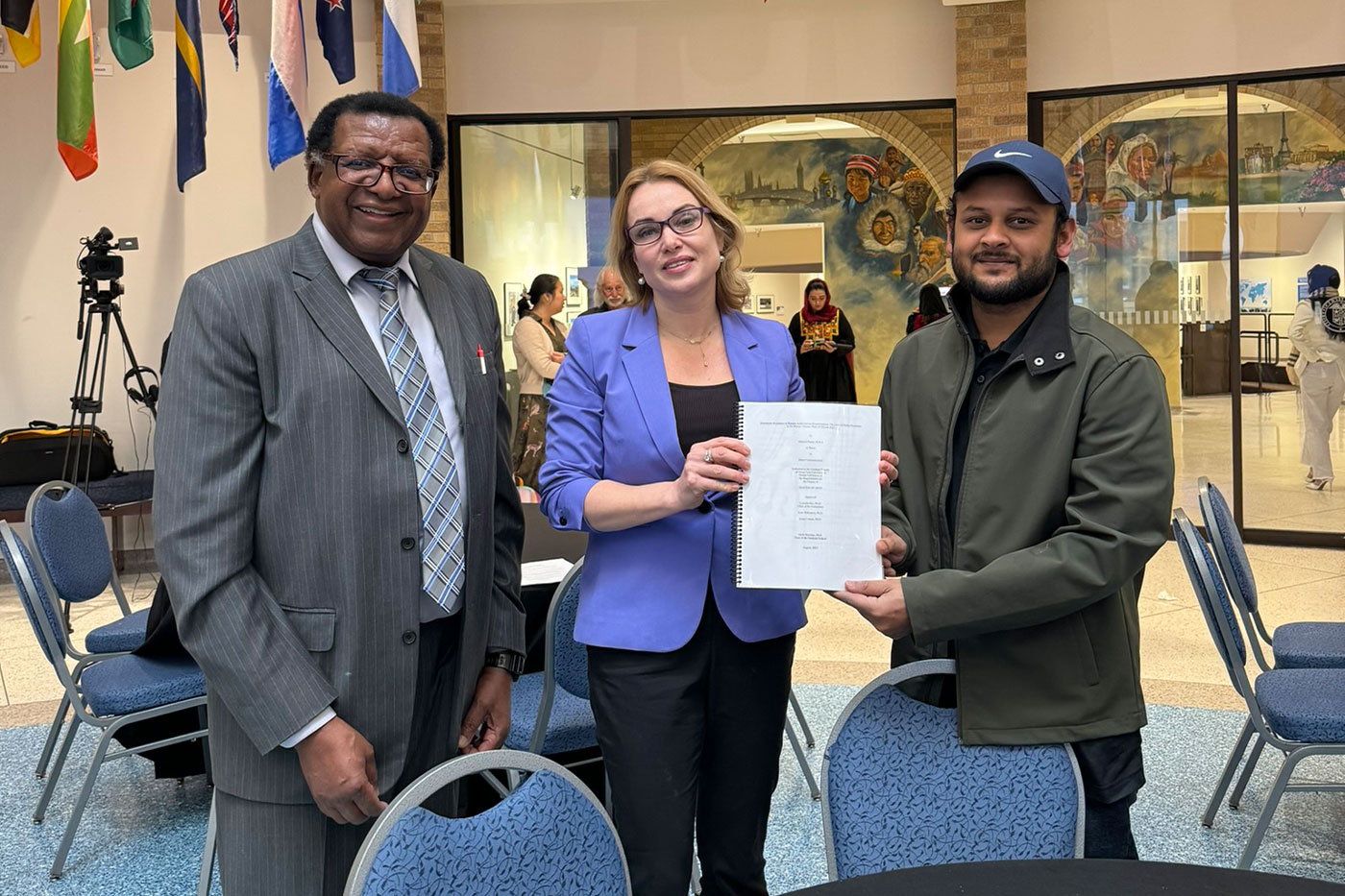
“Meeting Marina Ovsyannikova was an amazing and unexpected experience,” Hasan said. “Seeing her was a once-in-a-lifetime moment. I had done my thesis on her, and within eight months, I was meeting her and handing her a copy of it. She even signed a copy.”
Hasan’s work, co-authored by Eko, was accepted for presentation at the International Communication Association’s annual conference in Australia. His presentation was met with applause, especially when the audience saw a photo of Hasan with Ovsyannikova.
“Ovsyannikova’s bravery and commitment to journalistic ethics left a profound impact on me,” Hasan said.
He was not the only one inspired by Ovsyannikova’s time on campus. Faculty, administration and members of the public listened raptly to the journalist’s charge.
“Students must understand that an axis of evil has appeared in the world,” Ovsyannikova said. “Dictatorial regimes pose a direct threat to civilization. Therefore, the most important thing for journalists today is to continue to fight for democracy around the world and defend human rights.”

